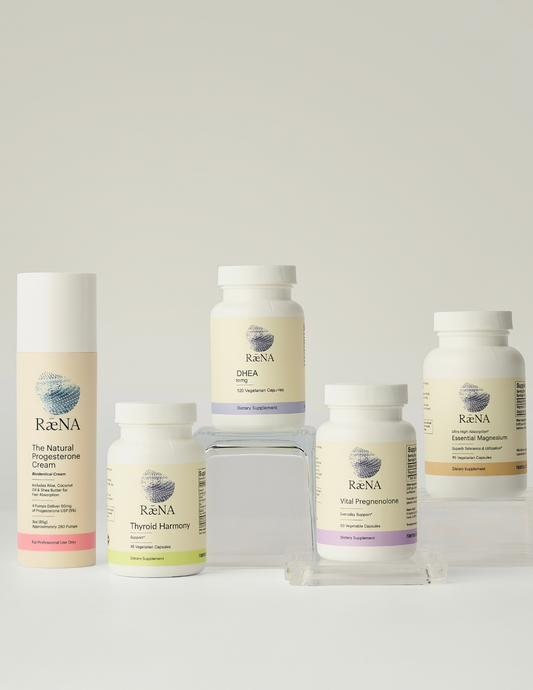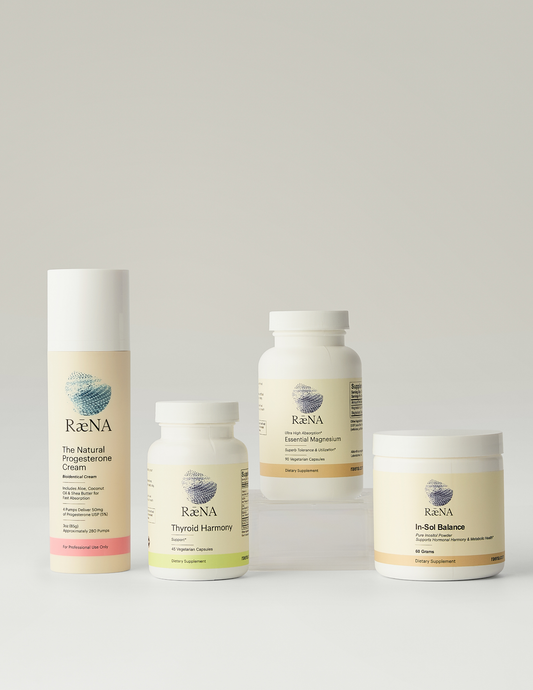
How Hormone Imbalances Contribute to Leaky Gut 💡
Alannah ConnealyWhat is leaky gut?
“Leaky gut”—also known as increased intestinal permeability—is a term used to describe a digestive condition where the tight junctions that hold intestinal cells together become damaged or dysfunctional, allowing toxins and bacteria to enter the bloodstream. These toxins are recognized by the body’s immune cells, triggering a series of responses that lead to inflammation.
Leaky gut can contribute to the following symptoms:
-
Chronic diarrhea, constipation, or bloating
-
Nutritional deficiencies
-
Fatigue
-
Headaches
-
Brain fog and difficulty concentrating
-
Skin conditions like acne or eczema
-
Joint pain

Kinashi & Hase, 2021
How are hormones involved?
Stress hormones like CRH & cortisol direct blood flow away from the gut to preserve resources for the brain, heart & muscles. Blood contains oxygen and essential nutrients needed to support the high energy requirements of cells lining the intestine. When intestinal cells don't receive enough resources, structures like tight junction proteins lose their function, leading to leaky gut.
Stress hormones also reduce intestinal motility by inhibiting peristalsis-wavelike contractions that move food through the digestive tract. Having less than 1 well formed bowel movement per day allows food to stagnate, creating a breeding ground for bad bacteria. When the body is in
"fight or flight" mode it puts a pause on "rest and digest" functions. Even when you aren't running away from something, you can be in fight or flight mode due to high stress.
Progesterone inhibits CRH & opposes the effects of cortisol. Natural progesterone has been shown to reduce leaky gut by promoting the integrity of tight junctions. During the second trimester of pregnancy when progesterone levels rise, blood levels of bacterial toxins (LPS) & inflammatory cytokines (TNF-a, IL-6) are significantly lower than the first trimester, indicating less leakage of toxins from the gut into the bloodstream.
Cortisol increases the expression of aromatase, the enzyme that makes estrogen. While healthy levels of estrogen help maintain barrier function, excess estrogen that is associated with stress can contribute to gut dysbiosis, intestinal permeability, and inflammation. Women with estrogen dominant conditions like cancer, autoimmune diseases, and endometriosis have a higher prevalence of gut dysfunction.
The relationship between estrogen & the gut goes both ways. Bacterial overgrowths & imbalances lead to the over-expression of B-glucuronidase-a bacterial enzyme that releases estrogen in the gut-making estrogen more readily absorbed back into the bloodstream, which can lead to estrogen dominance.
Factors that promote leaky gut
-
Emotional and mental stress
-
Inadequate sunlight or excess blue light
-
Irritating foods and additives
-
Poor sleep quality
-
Environmental toxins (mold, heavy metals, flame retardants, polluted air/water, chemical-laden products)
-
Excessive alcohol
-
Overtraining or heavy exercise
-
Hormonal birth control
-
Intestinal parasites
-
Low thyroid function
-
Certain medications
Things that can help protect against leaky gut
-
Avoid seed oils (corn, canola, soybean, sunflower, safflower, grapeseed, peanut) which cause inflammation, inhibit digestion and impair mitochondrial respiration
-
Sunlight & red light—stimulate energy production & tissue repair, shown to improve composition of gut microbiome and lower intestinal inflammation
-
Minimize hard to digest foods like raw leaves, grains, beans, nuts & seeds
-
Natural antimicrobials—vitamin D, lactoferrin, carrot salad w/ coconut oil & vinegar, well-cooked white button mushrooms
-
Eat enough carbohydrates—from easily digested sources like ripe fruit, honey, well-cooked potatoes, milk & masa harina. Carbs help suppress stress hormones, ensuring proper blood flow to the gut.
-
Adequate micronutrient intake—4-8oz liver & ~12 oysters weekly provides a wide array of fat soluble vitamins, B vitamins, and trace minerals like zinc that support the gut lining
-
Avoid irritating food additives like gums, carrageenan, sulfites, nitrates, bromides, MSG
-
20-40g gelatin/collagen daily—ideally from homemade broths


